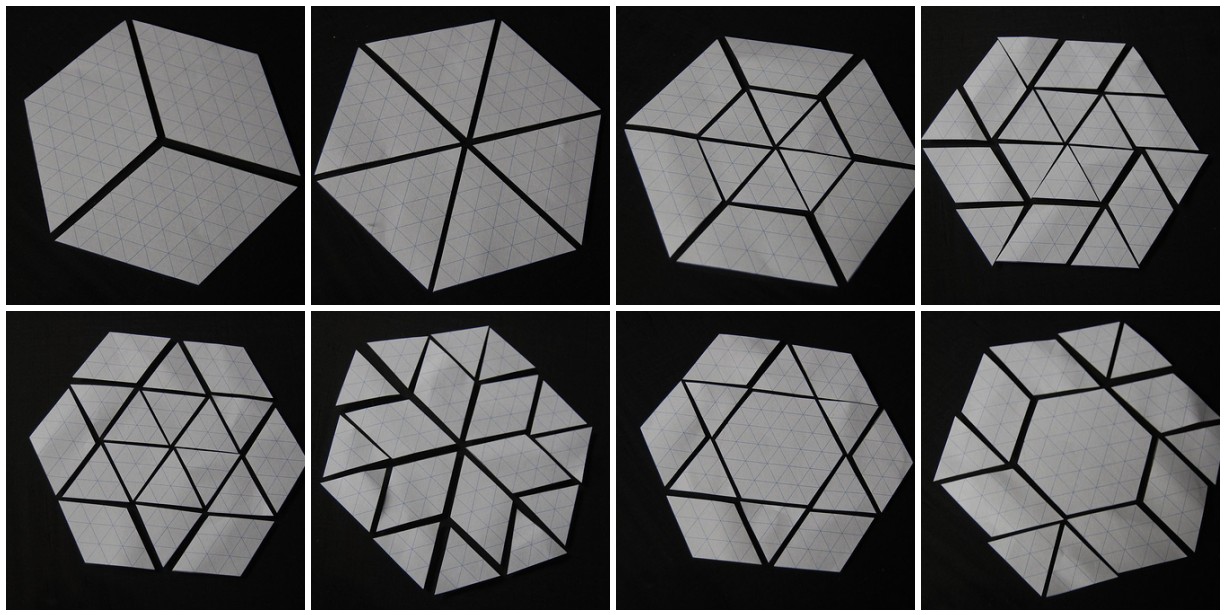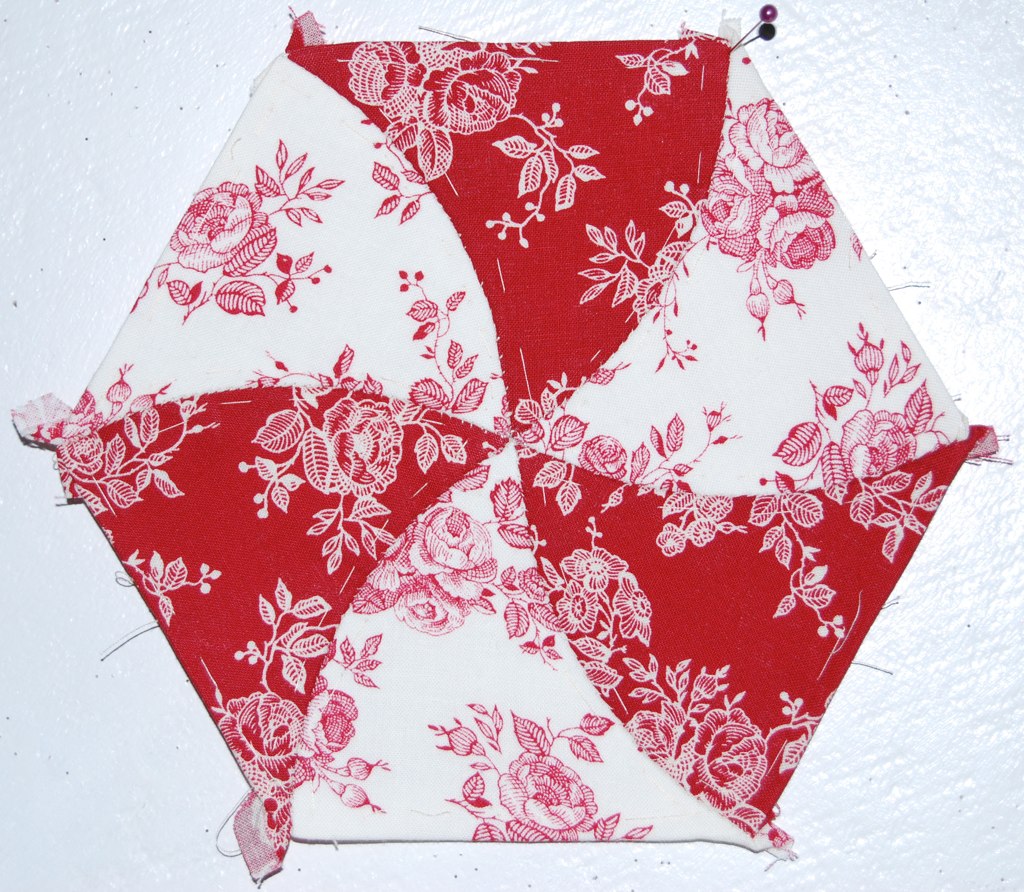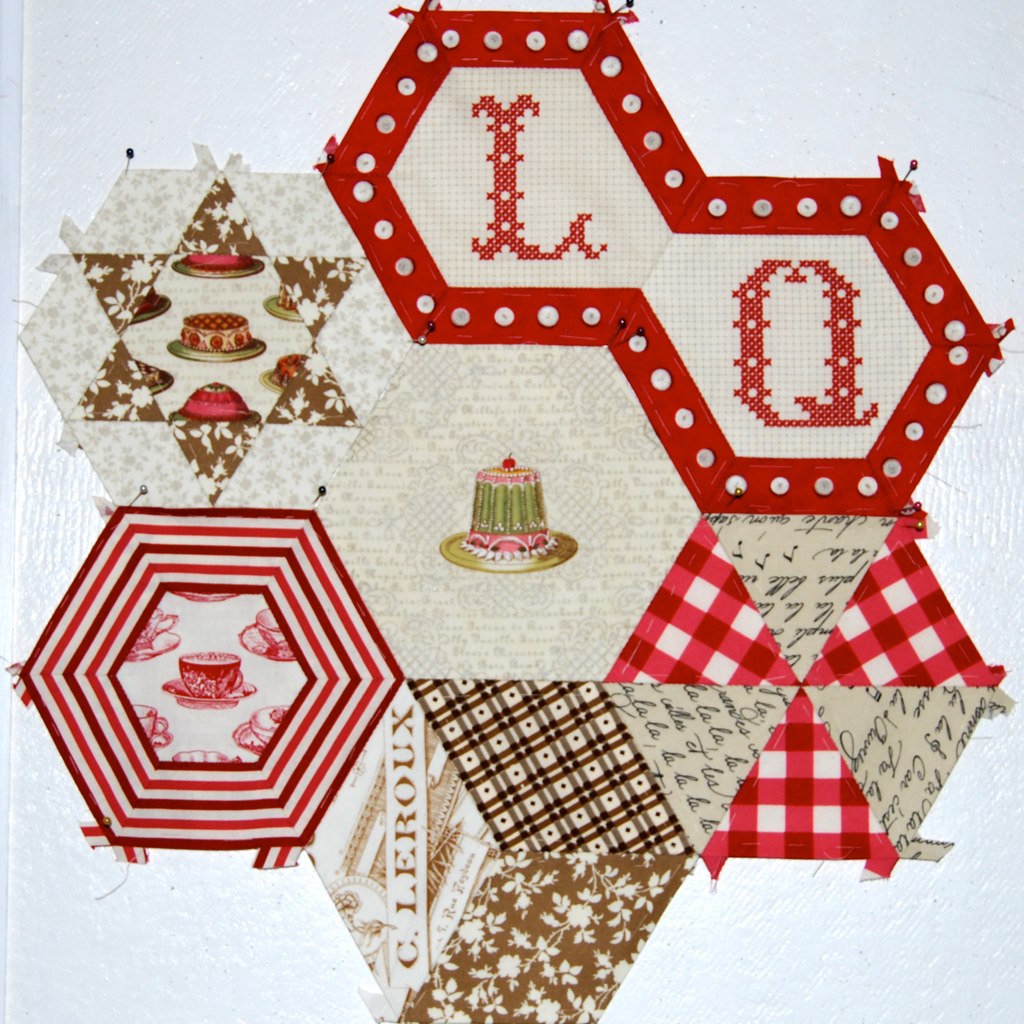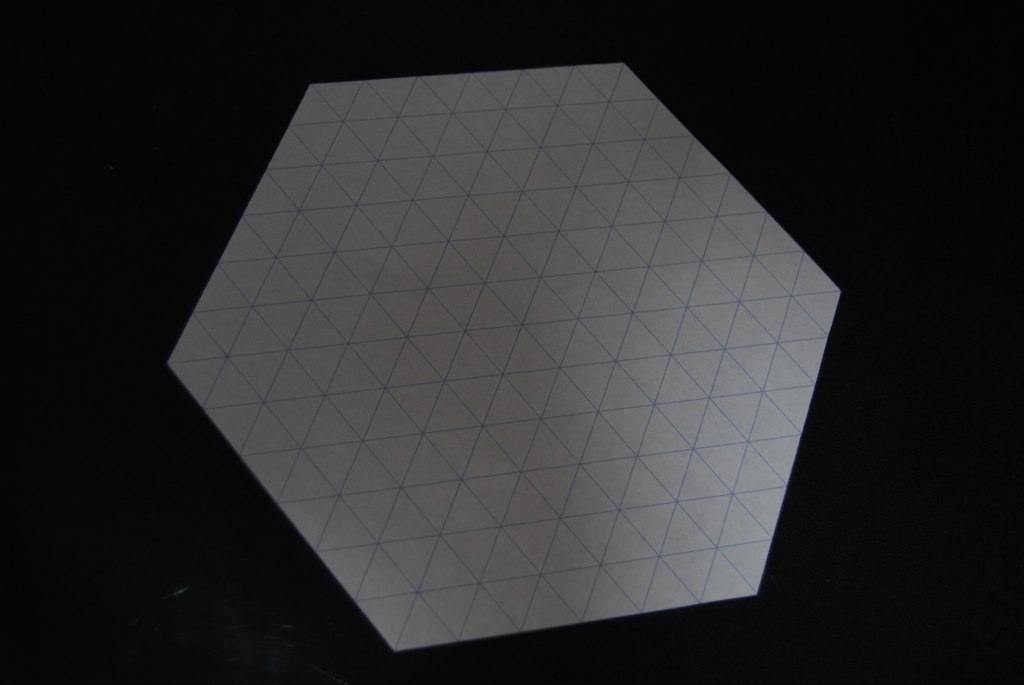You can join this Hexalong at any time and make any kind of hexagon project or follow the posts for this project. The starter post is here. For this project (and most hexie projects) you will need templates to cut and sew your hexies and other shapes. You have a few options here. I make all my hexies and EPP (English Paper Piecing) templates using incompetech and I will show you how to do that in a minute. However, you have other options.
Template Options
1. There is a set of printable templates for the Candied Hexagon quilt which you can find here and here.
2. Kerry Dear, who designed Candied Hexagons used the Marti Mitchell template set H.
3. I will be using incompetech printable graph paper. The advantages of this are (i) you can print as many sheets as you need; (ii) you can vary the size of the templates to suit your fabric selections; (iii) you can make more shapes than are possible just using a ready-made template set. Here is the incompetech pdf I have made and will be using for my project. If you wish to use this, make sure you select your printer to print landscape and do not re-size to fit your paper.
To make your own incompetech pdf.
1. Go to the incompetech equilateral graph paper generator here. Select your paper size. For this, I select "other" and swap the dimensions of A4 paper (standard UK printer paper) so that the pdf generates in landscape as you can fit more triangles on this way. However you can also create a regular portrait pdf by just picking one of the paper size options already there.
2. Reduce "minimum border" to zero.
3. I set triangle side length to 0.625 inches. 0.5 inches will give you large hexagons with 3" long sides but the patterns on my fabric called for a slightly larger hexagon so, with a bit of trial and error, I settled on 0.625 inches. You can set this measurement to whatever size suits your project.
4. Click "dowload pdf" and send it to print - choosing "landscape" in your printing options if you have created a landscape pdf and do not select any option which adjusts the size to fit your paper.
5. Take your printed sheet and draw a hexagon on it by drawing along the lines on the paper. Your hexagon needs to be six triangles long on each side. Cut this hexagon out and hold it against your fabrics to see whether the scale works with the fabrics you have chosen. This will be your key template and shows the size of each finished hexagon. We will cut these up into segments to make different types of pieced hexagons.
6. Too big or too small, generate a new pdf with different dimensions until you get the size you feel is right for your project. If you want to machine piece this project, you may prefer to choose bigger hexagons which machine piece more easily.
7. Once you have decided on your ideal large hexagon shape, print a few out and cut out the hexagons. These hexagons are now the starting point for all your pieced hexagon blocks.
8. Here is a photo to show you how cutting each hexagon into smaller shapes gives you quite a variety of pieced hexagon blocks.


1. There is a set of printable templates for the Candied Hexagon quilt which you can find here and here.
2. Kerry Dear, who designed Candied Hexagons used the Marti Mitchell template set H.
3. I will be using incompetech printable graph paper. The advantages of this are (i) you can print as many sheets as you need; (ii) you can vary the size of the templates to suit your fabric selections; (iii) you can make more shapes than are possible just using a ready-made template set. Here is the incompetech pdf I have made and will be using for my project. If you wish to use this, make sure you select your printer to print landscape and do not re-size to fit your paper.
To make your own incompetech pdf.
1. Go to the incompetech equilateral graph paper generator here. Select your paper size. For this, I select "other" and swap the dimensions of A4 paper (standard UK printer paper) so that the pdf generates in landscape as you can fit more triangles on this way. However you can also create a regular portrait pdf by just picking one of the paper size options already there.
2. Reduce "minimum border" to zero.
3. I set triangle side length to 0.625 inches. 0.5 inches will give you large hexagons with 3" long sides but the patterns on my fabric called for a slightly larger hexagon so, with a bit of trial and error, I settled on 0.625 inches. You can set this measurement to whatever size suits your project.
4. Click "dowload pdf" and send it to print - choosing "landscape" in your printing options if you have created a landscape pdf and do not select any option which adjusts the size to fit your paper.
5. Take your printed sheet and draw a hexagon on it by drawing along the lines on the paper. Your hexagon needs to be six triangles long on each side. Cut this hexagon out and hold it against your fabrics to see whether the scale works with the fabrics you have chosen. This will be your key template and shows the size of each finished hexagon. We will cut these up into segments to make different types of pieced hexagons.
6. Too big or too small, generate a new pdf with different dimensions until you get the size you feel is right for your project. If you want to machine piece this project, you may prefer to choose bigger hexagons which machine piece more easily.
7. Once you have decided on your ideal large hexagon shape, print a few out and cut out the hexagons. These hexagons are now the starting point for all your pieced hexagon blocks.
8. Here is a photo to show you how cutting each hexagon into smaller shapes gives you quite a variety of pieced hexagon blocks.

In the next post, I will be showing you how to master the basic steps of English Paper Piecing. As the hexalong goes along, I will also be talking about EPP with curved seams if anyone is brave enough to try that - and it's no harder than EPP with straight seams so you may as well - in for a penny, in for a pound, eh?







I have ordered fabric! Don't have what I need in Maine. I have ordered templates. I am waiting.....machine is clean, too.
ReplyDeleteCarol
Thank you for the graph paper i am off to draw templates for mine.
ReplyDeleteoooh! How exciting! Yes would love to try curved seams! And all this info is fabulous - didn't know all this template help was out there! Much better than getting your husband to make you templates with his compass! Thanks!
ReplyDeleteI love the graph paper. I used their hexie generator last year for my hexie quilt.
ReplyDeleteThis is so cool...wow...curved seams inside a hexie...wow...MUST TRY THIS!
ReplyDeleteI think I'm going to use quilt patis for a bunch of hexies made up of 60 degree triangles (2" sides), then some nice big hexies with 4" sides, and maybe some hexie tumbling blocks made up of 60 degree triangles with 4" sides and paperpieces.com has some interesting pieced hexies at 4"...and I'll have to mix in some of your more unusual designs. Wow. My head is spinning!
Thanks for the incompetech tips. That last hex with the curved seams looks amazing, can't wait to try that one!
ReplyDeleteoh how I love hexagons and posts like this ... everything you need, all in one place, you're a quilting superstore, Lynne! Thank you ...
ReplyDelete(I love those graph papers, they're brilliant - I used them for 1" hexie papers last year ...)
Wow. Fabulous information. I will be following along and am taking notes with each post!
ReplyDeleteThe fabric choices are just perfect too!
I would love to do the curved hexies....
ReplyDeleteGreat tips and tools, thanks L, Jxo
ReplyDeletegreat information Lynne - thank you
ReplyDeleteI fancy the idea of curved seams - and really fancy trying to block up and print out pattern pieces like on the Inklingo format (therefore omitting the paper element)
This comment has been removed by the author.
ReplyDeleteThat is a fabulously informative post, Lynne. It has my imagination firing....hexactly what I needed! I have so many ideas running around in my head. I love the curves in the hexi....and all the other ways you have shown. I'll never look @ a hexagon in the same way again! I purchased some fabric this afternoon for hexies in colours and designs I'd not normally choose.....I'm looking forward to growth, change and a heck of a lot of fun in the Hex-a-long.
ReplyDeleteI'm speechless. That first picture just took my breath away. And the curved piecing? Can't wait to find out how to do that!
ReplyDeleteLove the twisted hexagon, I will have to make one of those!
ReplyDeletenow how cute are you?! I love your LQ blocks! too fun!
ReplyDeleteStop tempting me with your fabulous projects lady. I have so much to do. Gah!
templates printed..... excitement is building, must start searching my stash! thanks for the fab instructions x
ReplyDeleteThis has helped me so much! Thank you for starting to ease my fear of Hexagons!
ReplyDeletewow, I am going to go and have a go with the incompetech, looks great! And I am desperate to learn the curved seams.
ReplyDeleteOMG you're a math genius on top of it all. You win. Dork.
ReplyDeleteI've ordered some solids to go with my polka dots. Can't wait to start!
ReplyDeleteThe graph paper generator is a great tip! In my process I tend to go back and forth between technical drafting and loose doodling. Your paper-piece samples are great examples of starting rigid (with graph paper) then experimenting freely.
ReplyDeleteThrow in a compass and you blow the roof off. You know I can't wait for a paper-pieced curves tutorial. Bring it on!
Thanks Lynne. I think the graph paper will make it easier to be more creative.
ReplyDeleteDo you know when you see a quilt and your heart just pounds and you know that you are so in love you just can't help it and it excites you??? That is me. Right now. I am new to your blog, sent by a blog friend who's joining in on your Hexalong. I guess I just might have to as well. Thanks to Jill at Northstar quilting!!
ReplyDeleteThanks for this Lynne, I just love the way you can cut your basic hexigon into different shapes, and love the curved ones.....will I live long enough to try all of these things.....or even be bright enough to follow your instructions on the pdf file..... must try to work harder and quicker...
ReplyDeleteI'm in love! This will be my first "quilt along" as I have never been very interested...but you have converted me!!!!
ReplyDeleteHi! I'm a late joiner but I'm very excited! I've never done a Quilt Along before. Is there any etiquette that I need to know? x
ReplyDeleteAlthough I am an obsessive EPPer I'm not a fan of Grandmother's garden style hexagon quilts but love 7 sisters and the like - thank you for the discovery of online graphpaper - I always love finding online resources to use for patchwork. Danielle
ReplyDelete